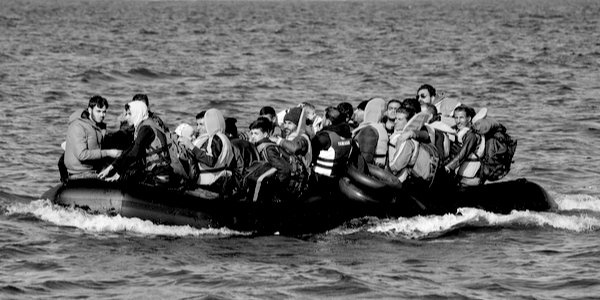WHAT is the magic of the number five? Marketing experts have been telling us to eat ‘five a day’ for years, and they’re a lot less fun than Popeye who didn’t nag but illustrated the uncanny power of spinach.
In the political world where ministers are constantly wanting to deliver stuff like kamikaze scooter pests weaving dangerously into one’s path, the number five has a similar totemic value.
First there was the wonderfully absurd Edstone on to which Ed Miliband set his Five Pledges rather like the back cover of an Asterix book.Today we have Rishi Sunak’s pledges which he has been pedalling around like five pizza boxes on the back of a bike; what distinguishes Rishi from your Deliveroo guy is that Rishi’s boxes are all empty.
The promise to stop the small boats is the one destined to despatch the Conservatives into oblivion. The Rwanda policy was a ridiculous attempt at a partial solution to a real problem which only made any sort of sense given a refusal by government to grasp nettles. Thus international agreements and the manner of their interpretation by the courts will always favour humanitarianism in the broadest sense over the respect of national laws and the population which those laws are in place to protect.
The Rwanda plan was always very limited in its scope, with no more than a couple of hundred illegals being sent to the small central African country and with the UK accepting some Rwandan refugees in return. If your sensibilities are offended by the idea of letting those wishing to break our laws to risk drowning in the attempt, it’s likely that consigning would-be illegals to a camp in a country where one half of the population massacred between half and three quarters of a million of the other half a mere thirty years ago won’t fill you with a sense of liberal superiority.
Now, ironically, one half of the Conservative parliamentary tribe is at loggerheads with the other half in a genocide which will see both groups annihilated.
A more imaginative and effective approach to the problem would have been to recognise that people-smuggling is a substantial industry which relies not only on well-heeled migrants prepared to pay the fees but also on the smugglers and their agents who run the enterprise in source countries. Your would-be migrant doesn’t simply turn up on a beach in, say, Normandy and stroll up to a kiosk run by the local rep to ask what time the next boat is leaving. There is an entire network of people, vulnerable like all networks, one would have thought, to infiltration and disruption, yet we hear nothing about this or the remarkable successes of international intelligence and policing in undermining the organisation. Contrast this with drug hauls where impressive kilos are sequestered by exciting joint ops and celebrated in extravagant press releases.
The counter-argument is that this is all very dangerous and difficult, or possibly that such strategies have been tried but haven’t been fruitful. But a government trying to reassure the population that the problem is being addressed, even if unsuccessfully, would talk about attempts in preference to being silent.
Leaving aside the people, what about the infrastructure that underpins the small boats operation? The government’s own out-of-date statistics tell us that ‘1,000 boats were detected arriving to the UK in the year ending June 2023’.
Let’s stay with this nice round (understated) number and consider the following. Everyone has seen pictures of such small boats being intercepted and their occupants being taken on board RNLI and coastguard vessels. These are not small boats in the sense of something you might pick up in a petrol station on your way to the seaside and blow up on the beach with a bit of puff. Nor are they the inflatables that yachtsmen use as tenders to get ashore from their moorings.
These are serious bits of kit similar, I imagine, to lifeboats on a ferry. And then there are the motors. A life-raft isn’t intended to take its passengers to the nearest land but to keep them in safety until aid arrives. You need serious horsepower to move a boat across a serious body of water; this kind of outboard is going to weigh a lot and require a number of people to transport and fit.
A thousand such craft and their engines represent a significant uplift, surely, on the normal volumes of both that are commercially available on the northern French and Belgian coasts, so how difficult can it be to trace the purchaser? How hard can it be to identify and interrupt the supply-chain from manufacturer to the embarkation points? This should be straightforward commercial intelligence which even Whitehall’s pyjama army should be capable of getting to grips with, even if it’s a lot more tiresome than doing nothing.
If humanitarianism gets in the way of policy to stop the boats because Parliament will not overturn overweening international treaties, and flocks of human rights lawyers argue in the interests of unwanted strangers, there can be no point in pretending that a Rwanda camp is like the Eden Project. The flow of illegal migrants will stop if the supply of transport is stopped. Disrupting the supply chains was always the intelligent way to go about the problem for a parliament wedded to the existing international order – which may be why it hasn’t been tried.

